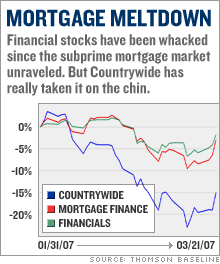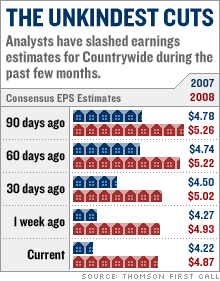Countrywide not getting proper 'credit'Stock Spotlight: No. 1 mortgage lender's stock has taken a hit on delinquency woes. But is it unjustly tarnished by the subprime mess?NEW YORK (CNNMoney.com) -- Outside of people swinging hammers for a living, few fortunes are more closely tied to the housing market than Countrywide Financial's. And for years, that was just the way investors liked it. The nation's biggest mortgage lender rode low interest rates and soaring housing prices to annual revenue growth of some 40 percent over the last five years, sending its stock soaring 240 percent over that period.   But as concerns about rising defaults and foreclosures started to take hold last month, shares of most financial institutions slumped. Most of the concerns focused on subprime borrowers - home buyers with weak credit. Companies with the biggest exposure to the subprime market, like New Century (Charts) and Accredited (Charts), felt the most pain. But subprime lending had spread across the industry and even Countrywide, which makes most of its loans to buyers with good credit, had built up a portfolio of subprime loans. The company warned last week that despite its comparatively small exposure to the subprime market, it could still take an earnings hit when it reports first-quarter results. And Countrywide executive managing director Sandor Samuels told a Senate panel Thursday during a hearing about mortgage lending that the company's subprime mortgage defaults this year might be the worst in company history. (Full story) Worries about rising defaults and subprime loans have helped drive Countrywide's (Charts) stock down 18 percent from its all-time high of $45.03 in early February. But the company has gone all-out to diversify in recent years, with fast-growing banking and insurance operations. So are Countrywide's current problems just a blip, or a sign of more tough times to come? Subprime implosion The subprime market grew so explosively in recent years in part because traditional lenders shied away from first-time buyers with a limited or poor credit history. This created a huge opportunity for companies willing to lend to these riskier home buyers, who paid much higher interest rates on their loans. One of five mortgages in the U.S. over the last two years was classified as subprime, according to Standard & Poor's. Countrywide saw the opportunity in high-interest mortgages, and quickly became the country's fourth-biggest subprime lender, with $40.6 billion in such loans in 2006. Despite that growth, subprime loans made up just 8.7 percent of Countrywide's total loans last year. And one analyst noted that Countrywide did not cater to the riskiest of subprime borrowers, the ones most likely to default. "A big chunk of the subprime space has been wiped out over the last couple weeks," said Paul Miller, an analyst with Friedman, Billings, Ramsey & Co. "But Countrywide is not exposed to that part of the market. Their definitions of subprime has been higher - buyers with less risk - than those of their competitors." So while rising delinquencies are casting doubt on some companies' prospects, analysts look for the shakeout to hurt only Countrywide's earnings for a few quarters. And with many rival lenders imploding, some Countrywide investors see an opportunity - a potential business boost. "When the shakeout is over, Wells Fargo, Washington Mutual and Countrywide will definitely be picking up market share," said Bruce Marra, President of West Chester Capital, an investment firm that owns shares of Countrywide. Banking on diversification Countrywide recently has made moves to bring in more revenue from businesses less tied to growth in the housing market such as banking, loan servicing and insurance. To be sure, revenue from mortgages made up 50 percent of the business in 2006. But the other divisions are growing steadily. Sales from banking, for example, rose to 16.4 percent of total revenue from 14.6 percent in 2005. Insurance made up 11 percent of Countrywide's sales last year and revenue jumped 22 percent. The growth has turned Countrywide into one of the top 20 banks in the country based on total assets, according to stock and mutual fund research firm Morningstar. Countrywide has expanded by adding banking kiosks and services to existing home loan branches, which Morningstar analyst Ryan Batchelor describes as "a very low-cost structure, allowing the firm to offer higher-than-average rates on its deposit products and still earn healthy profits." Investors even see Countrywide challenging long-established banking competitors. "[CEO Angelo] Mozilo has built up a bank which has had a fantastic growth record, and is running circles around Bank of America and Wells Fargo," said Seth Glickenhaus, a money manager at Glickenhaus & Co, which owns Countrywide. One of Countrywide's best assets is actually a part of its mortgage division: its servicing portfolio. When the company services a mortgage, it signs on to handle all the nitty-gritty afterwards: sending out the coupon and collecting the payments. It receives interest and fees from the operation. And though Countrywide sells off many of the loans it originates, it maintains servicing rights on them. The lender took in $1.55 billion in revenue from the servicing division last year, or 13.5 percent of total sales. "Even with credit quality declining, they can still benefit from the servicing portfolio," said Erin Swanson, another analyst with Morningstar. "When originations fall, the servicing portfolio should help to balance out some of mortgage revenue. It's a natural hedge for when times are tough in the industry - like right now." Last lender standing So with Countrywide's stock down so much in recent months, is it a buy? Analysts are expecting earnings of $4.22 a share in 2007, which means the stock is trading at a very low price-to-earnings ratio of 8.5. But the P/E is based on the assumption that annual earnings estimates won't head lower - and they've done nothing but fall over the last month. Still, rivals are trading at much higher valuations - Washington Mutual (Charts) has a P/E of 11.6 and Wells Fargo (Charts) trades at 14.2 times this year's estimates. Countrywide should probably trade at a lower multiple than larger, more diversified banks like WaMu and Wells Fargo but this discount might be too steep. "This stock has been one of the star performers in the market over the last 15 years," said Marra at West Chester Capital. "Yet it's never been afforded the kind of multiple that its growth has shown." But adding to investor wariness is the fact that Mozilo has sold Countrywide shares worth $14.3 million since Feb. 28 - and $140 million worth over the past 14 months. Morningstar's Swanson said this should not be a concern though. "This is something he's been doing the last couple of years, not something he's decided to do just because the industry has hit a rough patch," said Swanson. "We would caution against reading too much into it." Company officials were not immediately available for comment. Analysts across the board see a big return to growth for company in 2008, projecting earnings of $4.90 a share, up 16 percent from this year. And it's not as if Countrywide is a stranger to the boom-and-bust mortgage business - Mozilo co-founded Countrywide in 1969. "Mozilo has been through this almost countless times," said Jerry Bruni, President of J.V. Bruni & Co, a Countrywide shareholder. "The historical record is quite clear on Countrywide - they've emerged stronger from every one of these downturns." Paul Miller does not own shares of Countrywide, but Friedman, Billings, Ramsey does investment banking with the company. Neither of the Morningstar analysts own shares of Countrywide, and their firm does no business with the company. Dodd: Top 5 subprime lenders may testify |
|
